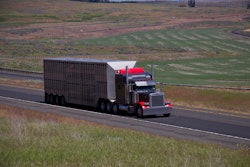
The Federal Motor Carrier Safety Administration has extended until Feb. 28 its COVID-19 emergency declaration. It was due to expire today.
The declaration waives Part 395.3 (maximum driving time) of the Federal Motor Carrier Safety Regulations for carriers providing emergency relief related to the pandemic.
The declaration is limited to the transportation of:
- Livestock and livestock feed;
- Medical supplies and equipment related to the testing, diagnosis, and treatment of COVID-19;
- Vaccines, constituent products, and medical supplies and equipment, including ancillary supplies/kits for the administration of vaccines, related to the prevention of COVID-19;
- Supplies and equipment necessary for community safety, sanitation, and prevention of community transmission of COVID-19 such as masks, gloves, hand sanitizer, soap, and disinfectants; and,
- Food, paper products, and other groceries for emergency restocking of distribution centers or stores;
- Gasoline, diesel, jet fuel, and ethyl alcohol; and,
- Supplies to assist individuals impacted by the consequences of the COVID-19 pandemic (e.g., building materials for individuals displaced or otherwise impacted as a result of the emergency).
The hours waiver applies only to drivers and carriers providing direct assistance, which means transportation and other relief services related to the immediate restoration of essential services (such as medical care) or essential supplies related to COVID-19 during the emergency.
The agency said it decided to extend the declaration because, “although the number of COVID-19 cases began to decline in the U.S. following widespread introduction of vaccinations, persistent issues arising out of COVID-19 continue to affect the U.S., including impacts on supply chains and the need to ensure capacity to respond to variants and potential rises in infections. Therefore, a continued exemption is needed to support direct emergency assistance for some supply chains."









